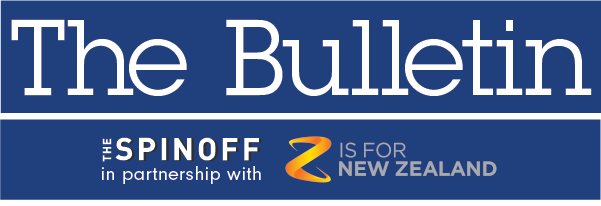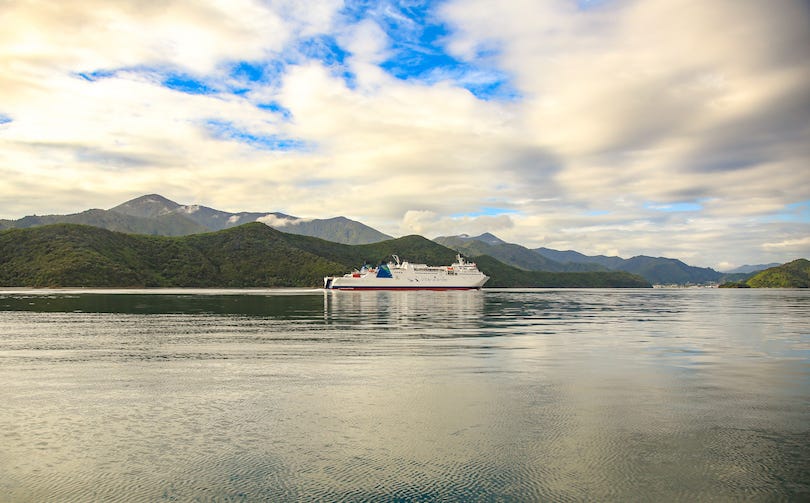South Island looks to break away from lockdown
With cases in Auckland and Wellington, cabinet will vote today on whether any parts of the country can exit strict lockdown as infection numbers plateau.
Good morning and welcome to The Bulletin for Friday, August 27, by Justin Giovannetti. Presented in partnership with Z Energy
In today’s edition: Another big lockdown decision, a ruling by the environmental regulator leaves experts scratching their heads and more opposition to water changes.
A lockdown decision is coming today. The prime minister will announce this afternoon whether the rest of New Zealand, outside Auckland, is ready to exit level four. Auckland will remain under strict lockdown until at least September 1. The NZ Herald has reported health officials as saying the lockdown is working and infections might be starting to plateau.
Many in the South Island will be watching. While it's unclear what cabinet will decide, the country could be split in half, with the South Island moving to a lower alert level. Director-general of health Ashley Bloomfield has warned against expecting an immediate move to level two, Stuff reports. While many in the South Island support the lockdown, some businesses are very keen on a move down the alert levels.
The decision will be announced by the prime minister and Bloomfield at 3pm today.
Before cabinet decides, The Bulletin asked some health experts what to expect:
Lesley Gray
Public health expert from the University of Otago
What should the decision be for non-Auckland?
Depends where. If we continue to only have positive sampling in Auckland, Wellington and Warkworth, I think there is the potential for those regions to stay at level four and other North Island regions to drop to level three.
Should the South Island be different?
I think it is possible the South Island could move to level three now, with no wastewater pickups, however I can appreciate why the government was being cautious due to the spread of contacts throughout Aotearoa. We cannot take any chances with this delta variant so while I think a move to level three is possible, the government may well keep us all in level four until Tuesday.
What's your prognosis for Auckland at this point?
We may not yet be at the peak of positive cases, so today will be telling. However, we will get a lid on this and start to see numbers coming down.
Collin Tukuitonga
Public health expert and associate dean at the University of Auckland's Faculty of Medical and Health Sciences
What should the decision be for non-Auckland?
If there are no cases in the South Island over the next few days, cabinet may well look to reduce the South Island to level three. Anything lower would be risky until all contacts have exceeded the usual incubation period of 14 days. I expect continuing adherence to public health measures and encouragement to get vaccinated. We may see the North Island remain at level four.
Should the South Island be different?
Yes, if no new cases are reported, and travel to and from the North Island and Australia remains restricted.
What's your prognosis for Auckland at this point?
Much depends on trends over the next few days. I expect that Auckland will remain at level four for another two weeks, longer if the number of new cases continues to rise over the next few days.
Michael Plank
Covid modeller from the University of Canterbury and principal investigator at Te Pūnaha Matatini
What should the decision be for non-Auckland?
Provided there are no new cases or close contacts outside Auckland, moving to level three would be reasonable. This would allow a bit more freedom but provides a safety net in case there is a hidden outbreak somewhere.
Should the South Island be different?
It’s important to remember that there is essential travel between islands and this creates opportunities for the virus to move. The current outbreak started via an infected traveller from New South Wales, despite stringent border controls. The Cook Strait is a lot smaller than the Tasman Sea and we don’t have 14-day quarantine for people travelling between islands. So while there is a large active outbreak in Auckland, there is a risk the virus will eventually jump islands.
What's your prognosis for Auckland at this point?
There are promising early signs the lockdown is working as intended. Hopefully this means cases will plateau over the week ahead and then start to come down. But it’s looking likely Auckland will need to stay at level four for several weeks yet.
Nick Wilson
Public health expert from the University of Otago
What should the decision be for non-Auckland?
I think that if there are very tight border arrangements around Auckland then it might be reasonable to move to level three for the rest of New Zealand. By tight I mean only emergency workers can cross, or perhaps only essential workers who are double-vaccinated and they would need to have minimal contact with others when outside the Auckland region before returning.
Should the South Island be different?
The South Island is easier to separate if there are concerns about the border being put around Auckland.
What's your prognosis for Auckland at this point?
Overall, I think Auckland will be on track to succeeding with outbreak control...but it might mean a few more weeks at level four.
These are the good times, warns David Skegg. There are now 277 cases in the community. The epidemiologist appeared in front of a parliamentary committee yesterday to warn New Zealanders that the “war” with Covid-19 will only grow worse. In a moment that could cause eyes to open wide, he said that 2021 "is the golden year" before things get bad. Skegg, who helped write the government's reopening plan, said we’re going to see more outbreaks of delta once border restrictions are relaxed. He isn’t sure we can deal with them without lockdowns anymore. The Spinoff's live updates captured his comments at the end of another long day.
The Spinoff is doing our utmost to keep you updated on Covid-19 related news through this outbreak. Every dollar our members contribute directly funds our editorial team and is devoted to ensuring we do more. Click here to learn how you can support the team today.
An ozone-depleting gas can be used until 2033, EPA decides. Methyl bromide is used to fumigate logs for export and was meant to be phased out by 2005 under an international treaty. As RNZ reports, use has only increased in recent years as exports have soared and the EPA has extended the deadline by, give or take, 28 years.
Ian Shaw, a professor at the University of Canterbury, shared his thoughts with the Science Media Centre about the move. Please picture him shaking his head. “The way methyl bromide gas is used in our ports is highly questionable: good practice dictates that it should be vented high into the atmosphere to minimise human exposure. In NZ, it is often released into tarpaulin-covered log piles, and then because the gas is heavy it accumulates in low areas around the port. This means that human exposure is likely.”
The government's three waters package faces more opposition from councils. Farmers Weekly reports that Canterbury mayors are asking for the overhaul of the country's water systems to be paused. At the centre of the concerns seems to be the transfer of local water assets to one of four large public utilities created by the Beehive. Much of the programme hasn't been settled yet and the central government had asked councils to hold off on public consultations until everything was ironed out, but the South Island councils went ahead and held them anyways.
A different approach to the housing problem. Jacinda Ardern has repeatedly said she’s used every lever available to fix New Zealand’s housing crisis. She could look overseas for new ideas. Canada is in the midst of a federal election campaign and has seen house prices increase nearly as quickly as New Zealand. In response, The Globe and Mail (soft paywall) reports Liberal leader Justin Trudeau has unveiled a package that helps first-time home buyers save, lowers mortgage insurance, slaps a 1% annual tax on the value of underused homes and land, and expands the capital gains tax.
In another election worth watching: Germany. After 16 years in power, Angela Merkel is stepping down as Germany's chancellor next month. She's been the de facto leader of Europe and the most powerful woman in the world for half my lifetime. Many Germans would be happy for her to stay on, because the process to replace her has been a complete shambles, according to The Economist (soft paywall). Merkel's handpicked successor quit when her own party allied itself with untouchable far-right populists. Her replacement is so bland he’s tanked the powerful party in weeks. Meanwhile, the Greens soared and crashed. And now the country’s long-suffering Social Democrats are up in the polls and they seem as surprised as everyone else. Mutti, as many Germans call Merkel, won't save them from a tough choice this time.
Got some feedback about The Bulletin, or anything in the news?
Get in touch with me at thebulletin@thespinoff.co.nz
A Christchurch restaurant in level four lockdown. (Kai Schwoerer/Getty Images)
Right now on The Spinoff: Siouxsie Wiles in defence of lockdowns and the elimination strategy after a week where both have been under attack. Laura Walters finds the “be kind” mantra isn’t being extended to reporters and the opposition who have asked hard but legitimate questions. Bernard Hickey has deja vu as this second lockdown is likely, once again, to boost the wealth of the wealthy by billions. Peter Brook Bell reports that 14% of us shower only to think better, because it’s the one place we're truly alone. Mirjam Guesgen looks at what happened to geoengineering, the somewhat sci-fi ideas to save the world by changing it were the rage a decade ago and might be coming back.
For a feature today, a Covid-19 border system that makes MIQ look tame. As someone who went through New Zealand’s managed-isolation system, I would never claim that it was easy or fun, but reading about Hong Kong’s predicament made my head spin. World Politics Review (soft paywall) writes that the financial capital finds itself wanting to open up more, but is increasingly powerless as China shuts its borders with increasingly draconian measures. It also calls into doubt any travel bubble with China next year for New Zealand. Here’s a sample:
China’s unwavering commitment to the status quo leaves Hong Kong with little room to manoeuvre, even as local health experts warn that the strategy is unsustainable and could fuel further social grievances. Future schemes for quarantine-free travel with other countries would hinge on China’s approach to those destinations, tourism lawmaker Yiu Si-wing told the South China Morning Post. Singapore has dropped discussions for a travel bubble with Hong Kong, while cautiously reopening to the rest of the world, welcoming fully vaccinated travellers from a growing list of countries.
Sophie Pascoe wins silver in Tokyo. New Zealand's most decorated Paralympian won the medal in the 100 metre breaststroke, claiming the country's first medal at these games according to RNZ. Pascoe has now won 16 medals at four games and has a busy schedule next week to add to her haul. She's racing without her long-time coach, who had a blood infection last month. RNZ also has a profile on Pascoe that documents what an incredibly few challenging years she's had, but she also talks about asking a friend to move in with her and falling in love with him, so there's a nice ending.
That's it for The Bulletin. If you want to support the work we do at The Spinoff, please check out our membership programme.







